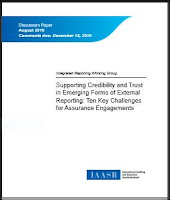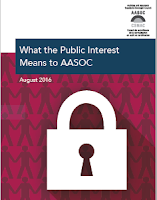The
Integrated Reporting Working Group of the International Auditing and Assurance
Standards Board (IAASB) has released a Discussion Paper, Supporting Credibility and Trust in
Emerging Forms of External Reporting: Ten Key Challenges for Assurance
Engagements. It is intended to facilitate an open
discussion about the IAASB’s potential role regarding emerging forms of
external reporting, which are referred to as “EER”, and where others can or
need to play a role in a holistic and interactive process to support
credibility and trust in these reports. A Frequently Asked Questions page and
a document called At a Glance
have been created as additional resources. Comments on the Discussion Paper are
requested by December 15, 2016.
It
is noteworthy that Challenge 8 of this Discussion Paper deals with Exercising Professional Skepticism and
Professional Judgment. It notes that, “There may be more areas that require
judgment in applying EER frameworks than in applying financial reporting
frameworks and more areas where the judgments in preparing the subject matter
information are susceptible to subjectivity and management bias. There are
therefore generally more areas where there is a need to apply professional
judgment and professional skepticism in EER assurance engagements. At the same
time, given the broader and more diverse subject matters addressed, it may be
more challenging for the practitioner to obtain the competence needed to
support the application of professional judgment and professional skepticism in
relation to such engagements.”
Furthermore,
“Professional judgment and professional skepticism are interrelated and play a
fundamental role in assurance engagements. The IAASB, in conjunction with the
International Ethics Standards Board for Accountants (IESBA) and the
International Accounting Education Standards Board (IAESB), is currently
exploring how best to emphasize the importance of exercising professional
skepticism within a financial statement audit, including whether changes are
needed to the ISAs or whether other action may be necessary.”


